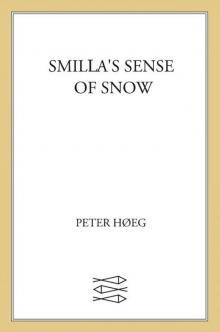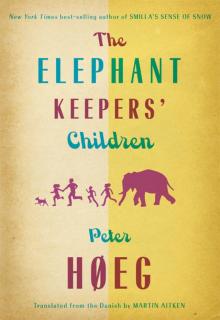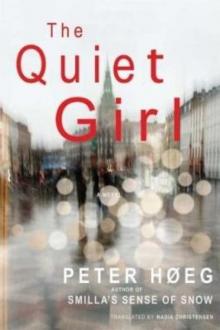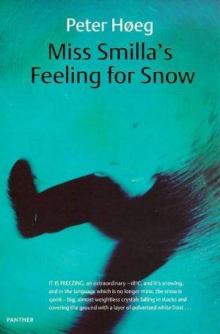- Home
- Peter Høeg
The Woman and the Ape Page 13
The Woman and the Ape Read online
Page 13
Neither Madelene nor the ape stirred. Hesitantly the doctor looked up at Madelene. When he spoke his voice was very hoarse.
“Nothing fits,” he said. “The body bears a faint resemblance to that of the dwarf chimpanzee but it’s too tall and too heavy and the facial skin is too pale. The cranium is as big as a gorilla’s but gorillas have a sagittal suture running across their skulls, serving as a linchpin for the masticatory muscles, and this one here’s skull is quite smooth. This coat is a summer pelt with vestiges of a winter one, but we know of no primates from a temperate climate. The hands and feet have the retentive grip found in humans but the prehensile musculature is formed like that of a gibbon. Had there been no more to it than that, I would go along with it, I would sign on the dotted line and report Burden, I would say to myself, ‘Well, even if we are going to hell in a handbasket at least we’re doing it in style.’ But that’s not all.”
He got into his coat.
“Apes can be trained to do the most amazing things. If they are hand-reared. And it goes without saying they end up a mess. Demonstrate abnormal behavior, become incapable of mating. But they can be tamed. Were we to assume that this fellow here has been brought up among humans, then that might explain his docility. And if we were less fussy about the scientific details, we could perhaps put his appearance down to his being some sort of crossbreed. But what we cannot explain away is the look in his eyes. Even the most psychologically twisted performing chimp cannot tolerate eye contact. It’s the ultimate challenge of the animal kingdom. What sets us apart from the animals is not language or intelligence. What sets us apart is the fact that we can look each other straight in the eye.”
He donned his hat.
“This thing is too big for me. It was your husband who started it. And his sister.”
Madelene said nothing.
“My pension,” said the doctor. “Have you any idea what it’s like to be a seventy-year-old living in Britain without a pension?”
“The veterinary police?” said Madelene.
“They’re supposed to hand over wild animals to the London Zoo. Which means Burden. A report has to be filled out, and this the Home Office will countersign once it has been ratified by the Animal Procedure Committee. Which again means your husband. And his sister.”
He bent his head.
“I’m sorry about this,” he said. “That’s why I’ve always got on best with animals. I was always almost as afraid as they were.”
“I must remember to tell Erasmus that,” said Madelene. “It’ll give him something to console himself with when they’re pulling him limb from limb.”
The doctor turned on his heel, opened the door and was gone.
Madelene stood by the window. Her eye fell on Adam down on the street, standing next to a white car. Out of the car climbed Inspector Smailes and three other men. Out of four other white cars climbed almost a score more, in no great hurry, dressed in pale, lightweight summer clothes. Parked farther down the street was a closed van with the initials RSPCA painted on its side. A collection van from the Royal Society for the Prevention of Cruelty to Animals. It was a tranquil scene, bathed in sunlight. And yet it represented, beyond a shadow of a doubt, the final phase of a hunt.
The men fanned out around the building. Madelene turned back into the room. The ape and the wheelchair were gone. She walked out of the room into the corridor. Some way down by a window stood the ape, looking out. In the walled garden backing onto Hyde Park the committee of the Royal Society for the Protection of Animals was gathered around a table loaded with Danish cakes and pastries, a sight that stopped Madelene in her tracks.
This table called to mind a birth. It smelled of milk, it ran with strawberry-marbled whipped cream, buttercream and confectioner’s custard, so perfectly formed that no one could have told from looking at it that within the past eight hours it had been both killed off and brought back to life.
The original idea behind this table had been that over this spread Adam would advise the committee of an extraordinary zoological subject that had come into his possession, going on to ask them for their support in keeping this hidden from both the public at large and the Animal Procedure Committee for a few weeks longer.
The table reservation had been canceled at four in the morning when Adam called his sister to tell her that his wife had run off along with the ape. It had been rebooked that very morning when he had rung to assure himself that Smailes had located the truck and that it was in the process of being surrounded.
Twenty minutes later he had called again to say that the van had been taken by storm and the driver arrested. But that Madelene and the ape were nowhere to be found.
Adam had lost two pounds in weight for every one of the past ten days, a fact borne out by the sound of his voice. Not only had he lost his wife and his ape, not only did he now have to watch the most crucial offensive of his career brought to a grinding halt or called off completely, but beneath all this there lay a more profound exhaustion. For three almost sleepless days and nights he had, for the first time in his life, been confronted with a zoological phenomenon that was not open to investigation.
This situation had led to the following conversation between him and Andrea.
“The papers,” said Adam. “She’ll go to the papers. And the police. That driver is the one who worked for Bally. We’re sunk. I’ve been considering suicide.”
“The newspapers,” said Andrea Burden, “know nothing about apes. But everything about the law of libel. Before printing so much as a line they will check back with the experts. With the Institute, that is. And that, little brother mine, means you. You will examine the ape and conclude that it is a chimpanzee. Of a rare but not unknown species.”
“They’ll confront me with Madelene.”
“And you will reveal—reluctantly, but constrained by circumstances—that your wife is an alcoholic. You won’t be spared the front pages. But the headlines will read: ‘Zoo director’s drunken wife steals rare chimpanzee.’”
“This will ruin my prospects.”
“It will give them a boost. You will not only have the support of the scientists and politicians. You will be buoyed up by the sympathy of the man in the street.”
Andrea Burden paused.
“What it will do to your marriage,” she then said airily, “is another matter.”
Adam shut his eyes, and came to a decision. Not a personal one, not a subjective or an emotional decision. What he did was to set up an imaginary chemical balance. In the one pan he placed Madelene, her drinking, her mystery, the now exhilarating, now depressing attraction she held for him. In the other pan he placed his future. His infinite potential, both professional and sexual.
It was not he who wrote off Madelene. It was the law of gravity.
“And this evening,” he said, “you and Bowen will appear on Newsnight and back me up.”
And so it was that this cornucopia of cake had been let off with its life, and now here it was, reminding Madelene that she had eaten nothing in more than sixteen hours or more.
The ape had not had anything to eat either and it was now on the move, making its way down the stairway, tripping lightly as a ballerina with the wheelchair under its arm. Madelene thought at first that it had got wind of what was afoot and was making one last, desperate bid for freedom. But at the foot of the stairs it stopped, swathed itself in the traveling blanket, slapped the hat down over its head, seated itself in the wheelchair, drew the veil down into place and bowled through the doorway, heading straight for the party around the table.
The meeting had not been formally called to order and so the circle opened up accommodatingly and with no surprise to admit the elderly lady in the wheelchair. Then silence fell, to be broken eventually by Sir Toby. He was related to this new arrival, he had ridden with her in the elevator, his back still ached from carrying her.
“Mrs. Mortensen,” he said, “Mrs. Burden’s grandmother.”
Everyone bowed polit
ely toward the veiled face. The committee members were twelve in number and these Sir Toby now proceeded to introduce one at a time.
He was halfway around the table when the old woman made a move. An arm shot out from the blanket, an inordinately long arm in a dressing-gown sleeve—like a crane at the end of which hung a grab in a workman’s glove. With care and exactitude this hand worked its way under an entire chocolate-coated Othello layer cake, lifted it and guided it underneath the veil.
Knowing, as he did, of the old woman’s deep sorrow and terrible problem, Sir Toby completed his introductions, his expression deadpan. The dowager’s other hand darted out, hovered in midair for a moment, then snatched up three jugs of cream in rapid succession.
Madelene emerged from the stairway. She crossed the patio, treading slowly and with dignity. She did not acknowledge the committee, did no more than nod at Susan, who registered the clarity and hopelessness in her friend’s face. Madelene took hold of the wheelchair, turned it around and pushed it the few yards to the bottom of the garden, down by the high wall adjoining Hyde Park. All she wanted was one last moment away from other people and in physical proximity to Erasmus.
She placed her hands on the ape’s shoulders. Then she closed her eyes and measured the full extent of her defeat.
She had believed that the law of the land would protect the ape and she had been wrong. She had expected social convention to allow her at least a breathing space and here too she had been wrong. She had pinned her hopes on her own triumphant feeling of being on the right track and this feeling had proved to be an illusion. Now she took stock of the universe and could discern no trace—not even out on the farthest reaches of her experience—of supreme justice. She was being driven, unresisting, toward conceding that the world is a machine in which men and animals are merely components or, at most, minuscule self-contained machines—in other words, lifeless—or worse still, a lifelessness that is lifelike in action, the tiny perpetuum mobile of death.
The door to the garden swung open and Adam, Inspector Smailes, the two vets from the RSPCA and a bunch of easy-does-it white men issued onto the patio. They split up into two groups, to skirt each side of the table.
Madelene lowered her head.
“I’m sorry I couldn’t do better,” she murmured.
A short distance in front of the wheelchair the men halted for a moment. One of the vets cocked his rifle, the other unfurled a net. Madelene looked back, the wall behind them was yellow, the sun and shadows dancing across its face had a merciless look about them, as though this were the wall before the firing squad, and more than that, a metaphysical wall, a definitive blockade against any hope of a meaning to life.
Then the ape got to its feet. It pulled off the hat, pulled off the blanket, the dressing gown, and let them drop. In the sunlight it faced up to the men: tall, short-legged, grotesque, with arms that hung down to the ground and a whipped-cream clown grin on its clean-shaven face.
The men instinctively took a pace backward. The ape wrapped its arm around Madelene’s waist.
“Let’s go,” it said.
It leapt like a cat, with no visible preparation, did an about-face in midair and ran, carrying Madelene, up the vertical face of the wall.
It perched for a second on top of the wall. Then it took off and to the people on the patio it seemed to spring straight up into the blue sky with Madelene and disappear.
part three
one
London is a troubled city. Its stock exchange and banks form the financial heart of the world; its mass media constitute the eyes and ears of the English-speaking world; its libraries, museums and archives stand anxious guard over the most comprehensive historical memory in Europe; it is the seat of government, it houses both the Lords and the royal family and, hence, the world’s largest repository of aristocratic genetic material. And through the University of London and that institution’s neural links with Oxford and Cambridge it is responsible for the inhabited world’s greatest accumulation of civilized intelligence, for the biggest brain on earth. With the result that this city is a hypochondriac; it frets to the point of distraction over its health and therefore boasts one of our planet’s most extensive and most paranoid immune systems. It was this monstrous, yet timorous piece of surveillance equipment that was activated minutes after the ape’s and Madelene’s vanishing act.
When Erasmus leaped from the wall, Andrea Burden turned on her heel and disappeared. She was gone for only a minute or two—a time frame so short that those who stayed behind in the garden did not even notice its passing but at the same time a flash of eternity insofar as, staring at the top of the wall, they felt that they were gazing up into infinity. But for Andrea Burden it was just enough time to walk to the nearest telephone and dial a number which bypassed the duty officers and put her straight through to someone in authority.
The man at the other end took down the details.
“Should we try to take it alive?” he asked.
It took Andrea Burden less than a second to weigh a number of complex considerations.
“There’s no reason to take any risks,” she said. “The experts consider it to be dangerous.”
This done, she returned to the patio, from which Inspector Smailes and his white men had already slipped away, whispered something to Adam, asked the committee to be seated and proceeded to present the first public—more or less—and not untruthful—at least not in all particulars—report on Erasmus the ape.
Within five minutes of her call Hyde Park had been cordoned off. Five minutes later the first helicopter from the Scotland Yard heliport on Thornhill Road flew over the park. Five minutes thereafter the first dog patrols went in. And five minutes after that sentry posts were set up at fifty-yard intervals around the entire perimeter of the park.
None of those who knew of or were involved in the search were in any doubt that the runaways would be tracked down within the hour. It is possible, under certain circumstances, for a person to evade detection in London. But not an anthropoid ape. Which happens to be holding a woman captive. And which has already been hemmed in.
* * *
Madelene and the ape observed the manner in which they were cut off from the outside world from the top of a lime tree situated next to Speke’s Monument by the Long Water in the northern section of Hyde Park. They were not readily visible, the ape having twined branches and leaves into a little cupola that screened them on all sides. But obviously it never occurred to Madelene to cherish any kind of hope. The police were everywhere, the nearest dog patrol was less than thirty yards away, diagonally below the tree in which they sat. Wherever she looked she saw men with walkie-talkies, with television cameras, telescopes and rifles with telescopic sights. She knew nothing of Andrea Burden’s telephone call. But she could hazard a guess at what the world around them was gearing up for—as far as the ape was concerned, at any rate. Not capture but execution.
Even so, her main feeling was not one of fear. More than anything else, she was filled—in this state of absolute hopelessness—with that curiosity which goes on growing in all living things, like hair and nails after death. She viewed the people and things around her with fresh clarity, freed from any interest in where they had come from and unconcerned as to where they might be going—distinctly, like after the first drink—acutely, like being in the midst of a diabolical but miraculously painless hangover.
She looked at the ape. It was following the course of the hunt, absorbed but unmoving, apart from the odd time when it stopped up a gap in an effort to perfect the leafy cupola. Madelene saw how much it resembled a little boy.
All at once she felt at home. She recognized the green universe that surrounded her; here were the hideouts of her childhood, in the trees of her childhood, with her childhood playmates. Although actually it was more than that, since in her childhood there had, in fact, been no trees. Her nursemaids had discouraged her from climbing aloft for fear that she would fall, in which case they would be fire
d; her mother had begged her not to because of a fear of heights so severe that it also embraced everyone else around her; and her father had forbidden it on the basis of a vague aversion to the thought that his daughter might climb out of sight and into the heavens while in the company of some boy. So the hideout that now arched over her head was not something which she had ever experienced. It was like a dream that was only now coming true. She and the ape were bandits and down below them on the ground there were not only soldiers but a consolidation of all the gangs of boys from strange streets and unknown neighborhoods whom Madelene had never fought against, and she followed them with eyes that were agog with excitement and yet totally serene.
She knew of course, as did the ape, that beneath them they had, not real live children, but something better, Death itself, and without giving any thought to it they both smiled the same smile. Contrary to what adults believe the joy of children at play comes not from having no knowledge of Death—every living creature has that. It comes from their divining what the grown-ups have lost sight of; that even though Death makes a fierce opponent, it is not invincible. The ape and Madelene laughed, soundlessly and convulsively, holding one another up, because they knew that tomorrow too they would be alive.
* * *
At sunset the guard on the outer wall of the park was doubled and at nightfall stands rigged up with searchlights were erected at hundred-yard intervals, lighting up the park like a football stadium. At the gates, patrols from London Fire Brigade’s Pioneer Squad armed with ladders and accompanied by the antiterrorist corps prepared to institute a systematic search of the treetops come daybreak.

 The Woman and the Ape
The Woman and the Ape Smilla's Sense of Snow
Smilla's Sense of Snow Borderliners
Borderliners The Susan Effect
The Susan Effect The History of Danish Dreams
The History of Danish Dreams The Elephant Keepers' Children
The Elephant Keepers' Children The Quiet Girl - Peter Hoeg
The Quiet Girl - Peter Hoeg Smilla's Sense of Snow aka Miss Smilla's Feeling for Snow
Smilla's Sense of Snow aka Miss Smilla's Feeling for Snow